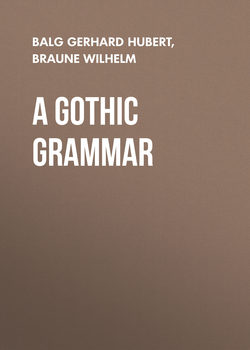Читать книгу A Gothic Grammar - Braune Wilhelm - Страница 11
FONOLOGY
CHAP. II. THE VOWELS
au
ОглавлениеAlso Goth. au (like ai) stands for historically and fonetically different sounds.
§ 24. I. The short vowel aú. —au in Gothic denotes a short open o-sound. In this case grammarians put an accute accent over the u (aú) in order to keep it apart from the difthong au. Goth. aú corresponds to o or u in OHG. and in the other Germanic languages.
The aú, before h and r in Gothic words, has in every instance developt from a short u which, when immediately followd by these sounds, was 'broken' to short ŏ. E. g.
waúrms, wurm; haúrn, horn; baúrgs (OHG. burg), city; waúrd, word; waúrpum, prt. pl. of waírpan, to throw (cp. § 32); saúhts (OHG. suht), sickness; daúhtar, daughter; aúhsa, ox; taúhum, prt. pl. of tiuhan, to pul; baúhta, prt. of bugjan, to buy.
Note 1. aú before other sounds is entirely exceptional and sumwhat doutful. Thus, in auftô, perhaps (onse also ufto; Mt. XXVII, 64), bisauljan, to sully; bisaulnan, to becum sullied. Holtzmann (altd. gr., p. 14) regards also ufbauljan (II. Tim. III, 4) as belonging to this class.
Note 2. The change of short u into aú before h is without exception. An apparent exception is the enclitic -uh, and, the u of which must be referd to a secondary development; it is never found after a short accented vowel, nor after a long vowel or difthong; e. g., sa-h, ni-h, þai-h, wiljáu-h, ƕarjanô-h; u occurs after consonants, and in polysyllabic words in which a final short a before the u was elided; as, ƕaz-uh, þammuh (= þamma uh), qiþuh (= qiþa uh). Sum, however, assume -ûh (cp. Beitr. 18, 299). – Other us before h ar all long: þûhta (cp. § 15). – There ar a few cases of u before r in unaccented syllabls (§ 13, n. 1), namely in the foren words spaikulâtur and paúrpura (beside paúrpaúra), purpl; so, also, in the Gothic fidur- (§ 141, n. 1) which, however, stands perhaps for fidûr- (cp. IF. 4, 334). – The prefix ur- (in urreisan, urruns, etc.) does not belong here; it is a late form for us the s of which was assimilated to a following r (§ 78, n. 4).
Note 3. Not every au before h and r has developt from u, but may also be the difthong au; as, háuhs, high; táuh, prt. of tiuhan (but pl. taúhum, § 31); gáurs, sorry (cp. OHG. gôrag, wreched, and Goth. gaunôn, to mourn).
Note 4. The au for u in the endings of the u-declension may be aú, but also áu which would be due to confusion caused by analogy. Beitr., 18, 280. – Cp. also uftô for auftô, § 24, n. 1.
Note 5. As a rule, the Greek ο is represented by aú; e. g., apaustaulus, ἀπόστολος; alabalstraun, ἀλάβαστρον; Barþaulaumaius, Βαρθολομαῖος; Pauntius, Πόντιος; aú = υ in Saúr, Σύρος; paúrpaúra, πορφύρα. – Goth. aú = o in the East Gothic name Thorisa. (Wrede, 'Ostg.', 76. 165).
§ 25. II. The old difthong au [= ou in E. house]. Every au not broken from u (before h, r; s. § 24 and note 3) is a difthong; it corresponds to OHG. au, ou, or ô (ahd. gr., §§ 45. 46), OS. ô, ON. au. Whenever it is likely to be confused with aú, we put (according to Grimm), an accute accent over the a (áu). E. g.
The prts. sg. of the II. ablaut-series (§ 31): gaut, I pour (inf. giutan); laug, I lied, etc.; laugnjan, to deny; daupjan, to baptize; galaubjan, to believ; galaubeins, belief; rauþs, red; dauþus, deth; —aukan, to increase; hlaupan, to run; stautan, to push, strike; —haubiþ, hed; augô, ey.
au in inflections and final occurs in the u-declension: sunaus, sunau; 1st pers. sg. opt.: nimau, nêmjau; 3d pers. sg. imper.: lausjadau; opt. midl: haitaidau.
Note 1. au often interchanges with aw (cp. § 42); e. g., taujan, prt. tawida, to do; mawi, gen. maujôs, girl; sniwan, prt. snau, to hasten.
Note 2. Latin writers express Goth. au by au; as, Ausila, Austrovaldus, Audericus. Cp. Wrede, 'Wand.', 96 et seq. Concerning East Gothic monofthongizations, s. Wrede, 'Ostg.', 165 et seq. (Zs. fda., 36, 2732).
Note 3. In the u-declension u is often found for áu; cp. § 24, n. 4; § 105, n. 2.
§ 26. Another au, historically, and probably also fonetically, different from the preceding ones occurs before vowels.
(a) For original ô: stauida, prt. of stôjan, to judge; staua, f., judgment; staua, m., judge; taui, n., gen. tôjis, deed (cp. also ubiltôjis, evil-doer; taujan, to do, prt. tawida); afmauidai and afdauidai, pps. of *afmôjan, and *afdôjan, to tire out, weary; sauil, n., sun.
(b) For û in the other Germanic languages: trauan (OHG. trûên), to trust; bauan (OHG. bûan), to dwel; bnauan, to rub (to pieces or powder. ON. (g)núa, OHG. nûan). Cp. also § 179, n. 2.
Sinse this au does not change into aw before vowels, it must denote a monofthong which is likely to be the long of aú, hense a long open o (= a in E. fall), while long close o (shading very much to û, like ô in E. home) is denoted by ô. Accordingly, Goth. antevocalic ô, û past into au. Cp. Brgm., I, 156. For the extensiv literature on this question, s. Noreen's 'Urgerm. Lautlehre', p. 34; also Beitr., 17, 563-567.
Note 1. Also Gr. ω before a vowel, which is represented as a rule by ô, is renderd by au: Trauada, Τρῳάς; Nauêl, Νωέ; Lauidja, Λωίς.
Note 2. ô before u occurs, however, in the preterit forms waiwôun (inf. waian, § 182), lailôun (inf. *lauan, § 179, 4). Cp. Beitr., 11, 742.
